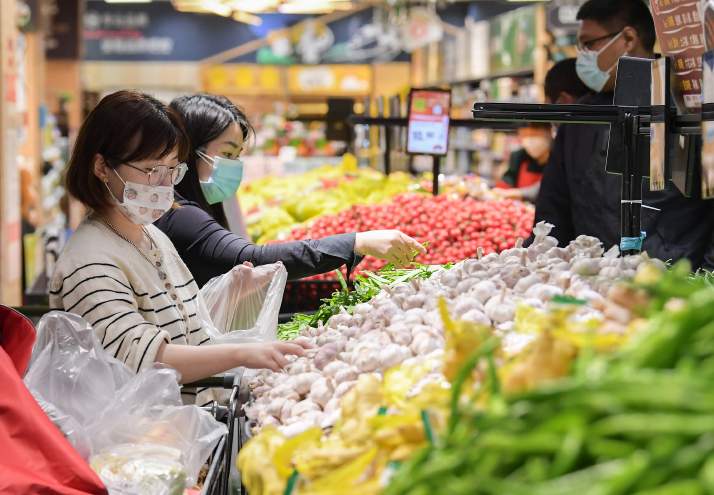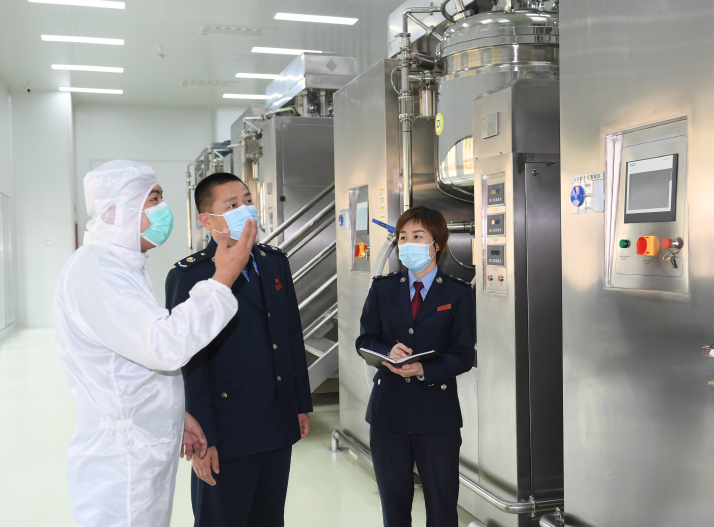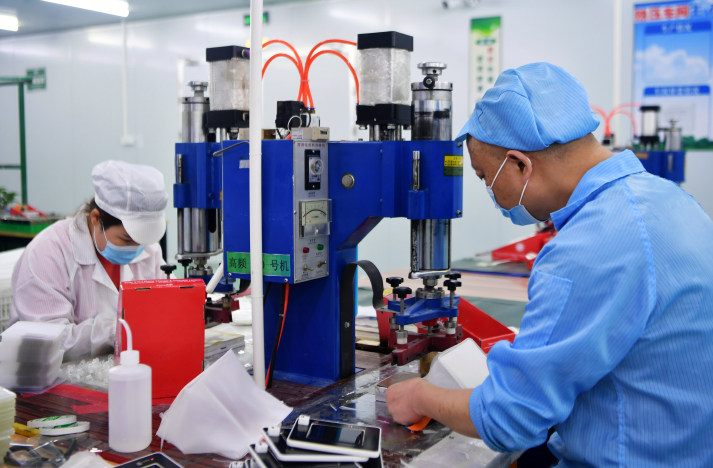| Business |
| China ramps up support for businesses more vulnerable to impacts of COVID-19 | |
|
|
 Shoppers select vegetables in a supermarket in Shanghai on May 10 (XINHUA)
Li Jin, General Manager of Tinythings, a media company based in Shanghai, has had a hard time during the COVID-19 resurgence in the city in recent months. The company, which has a dozen employees, was established in 2020 and focuses on making documentaries. Starting from March, all of its filming projects have been suspended. "The major costs of micro and small enterprises are office rent and staff salaries. Our clients cannot pay us in a timely manner during the pandemic, adding to our financial burdens," Li told Beijing Review. Many micro, small and medium-sized enterprises (MSMEs) and self-employed individuals are facing similar challenges. They include disruptions from COVID-19, rising commodity prices, declining market demand, labor shortages, high logistical costs and power crunch, according to Pan Helin, Co-Director of the Digital Economy and Financial Innovation Research Center at Zhejiang University's International Business School. "Meanwhile, MSMEs across sectors play a key role in ensuring steady economic and job growth, boosting innovation and improving people's wellbeing," Pan told Beijing Review. To support these businesses to weather the impacts of COVID-19, the government has introduced a slew of relief policies including tax cuts and refunds, administrative fee reductions and financial subsidies. Efforts are also being stepped up to stabilize commodity prices, lower costs of digital transformation for businesses, ensure smooth logistics and boost resumption of production. Financial institutions will shore up their support to cover more MSMEs and self-employed businesses. This year, large state-owned banks will add over 1.6 trillion yuan ($241.7 billion) of inclusive loans for micro and small enterprises, according to a notice issued by the State Council leading group for promoting the development of small and medium-sized enterprises (SMEs) on May 9. The lenders have been required to renew loans, extend and adjust repayment arrangements, and waive default interest for businesses in difficulties without affecting their credit records.  Staff of the local tax bureau provide consultations on tax refunds for a cosmetic company in Huzhou, Zhejiang Province, on April 20 (XINHUA)
Targeted support In recent months, Chinese MSMEs and self-employed businesses have been facing mounting pressure as pandemic-induced impacts continue to linger. In April, the SMEs Development Index, based on a survey of 3,000 firms, edged down 0.3 percentage points in April from the previous month to 88.3, the third consecutive month of decline for the index, the China Association of Small and Medium-sized Enterprises said. The sub-indexes for industry, construction, transportation and postal services, wholesale and retail, as well as hospitality and the food and beverage industry all retreated from a month ago, according to the association. Against the heavy downward pressure, targeted support from the government and financial institutions have become the source of confidence for many entrepreneurs. The Ministry of Finance has reduced or waived six local taxes and two fees, such as real estate tax and education surcharge for small and micro businesses. The tax and fee cuts came into play from January 1, 2022, and will be effective until December 31, 2024. The policies are aimed at supporting low-profit businesses with annual taxable incomes of less than 3 million yuan ($442,334), no more than 300 employees and 50 million yuan ($7.37 million) in total assets. The People's Bank of China (PBC), the central bank, along with other central government departments, issued guidelines in February on increasing financing support for businesses in the service industry, especially sectors of food and beverage, retail, tourism and transportation, where there are many MSMEs and self-employed businesses. The balance of China's inclusive loans to small and micro businesses stood at 20.8 trillion yuan ($3.1 trillion) at the end of March, up 24.6 percent from the same period last year. The number of recipients totaled 50.39 million during the same period, 2.2 times that at the end of 2018, the PBC said. Local governments have also introduced policies for cutting rental, power and water costs. Audio Specific Signal Processing, a Beijing-based computer chip company, is one of over 100 small and micro enterprises that have benefited from rental cuts unveiled by the municipal authorities in May. It received rental relief for six months totaling over 100,000 yuan ($14,744), which has been set aside for its research and development (R&D) programs. To ensure the stability of supply chains of MSMEs, local governments have encouraged greater participation of transportation and digital enterprises in related efforts. According to e-commerce firm JD.com, over 60,000 orders were made on its industrial supply platform between the beginning of March and April 20. Many companies found new suppliers using the service. Although MSMEs and self-employed individuals have gained much support, deferred payment is still a major concern for them. According to the National Bureau of Statistics (NBS), the average payment period for enterprises reached 54.7 days in the January-March period, compared to 30 days in pre-pandemic times. The prolonged duration is putting pressure on many product and service suppliers with tight cash flow. The authorities need to tighten oversight in this regard and introduce innovative financial tools, such as bills issued by core enterprises to other businesses on supply chains, to tackle the problem, Sun Wenkai, a professor at the School of Economics at Renmin University of China, told 21st Century Business Herald.  Workers on the assembly line at a solar-power light company in Quanzhou, Fujian Province, on May 14. The lights will be exported to Southeast Asia and the U.S. (XINHUA)
Boosting circulation Currently, rising costs of raw materials, transportation and overseas businesses caused by the pandemic and geopolitical conflicts are major challenges for many foreign trade MSMEs. Aosom, a cross-border e-commerce firm in Zhejiang Province, has seen rising orders from overseas markets this year, but inadequate production capacity of cash-strained upstream suppliers has affected its businesses. Eventually, some of its suppliers received a total of 30 million yuan ($4.4 million) of loans introduced specially for cross-border e-commerce companies from the Export-Import Bank of China, which has helped Aosom complete its orders. Some companies have sought new modes of business in response to the current environment. Jh Leicast Cookware Co. Ltd., a cookware manufacturer in Zhejiang, focused on the overseas market before 2020. Due to rising labor and material costs since the emergence of COVID-19, its products began to lose competitiveness in the international market. With supporting policies from the government, the company started to explore the domestic market. "To meet demands of domestic consumers, we developed new teams to redesign our products. The competition in the domestic market can be even greater, but we finally made it," Jing Xuezhan, assistant to the general manager of the company, told People.cn. According to Jing, the company received orders from two enterprises worth nearly 30 million yuan in 2021. Its products have also reached rural consumers, with annual sales averaging nearly 10 million yuan ($1.47 million). To support MSMEs engaged in foreign trade, a major driving force for China's economic growth, a State Council Executive Meeting in early May announced that credit loans issued to the firms will be increased. Banks were told not to withdraw, cut off or withhold loans to firms experiencing temporary hardship. Relieving pandemic strain With effective measures to balance COVID-19 control with development, China's economy remained stable in January-April. During this period, value-added industrial output measuring factory activities went up 4 percent year on year, and exports jumped 10.3 percent year on year to nearly 6.97 trillion yuan ($1.03 trillion), according to the NBS. However, industrial output declined 2.9 percent year on year in April alone from the previous month, and retail sales of consumer goods, a significant indicator of consumption, went down 11.1 percent month on month in April. At a press conference on May 16, NBS spokesperson Fu Linghui said the decline does not necessarily mean economic contraction in the second quarter, as Shanghai and Jilin Province, which are financial and industrial hubs hit hard by the recent COVID-19 flare-ups, are gradually resuming work and production. The Chinese economy is expected to improve in May, he concluded. Businesses in Shanghai have been reopening starting from May 16. The city will fully restore production and normal order of life from June 1 to mid-late June under the outbreak containment strategy. So far, Shanghai has included about 3,000 companies on its various white lists that allow businesses to resume their operations. More than 70 percent of them have restarted their business, the municipal government said. Many of the large enterprises in industrial production and sectors relating to daily necessities have restored a large proportion of their capacity, and small businesses such as convenience stores will soon reopen. According to a press conference on May 8, financial institutions in Shanghai provided about 70 billion yuan ($10.3 billion) of loans to more than 10,000 retail, food and beverage, tourism and transportation enterprises. For self-employed individuals, the municipal government called on financial institutions to defer payment periods of those affected by the recent flare-ups, and provide special support for the self-employed, such as owners of online stores. The city has also provided targeted support for small and medium-sized tech companies. It has pledged to ensure financing costs for these enterprises to remain below 2021 levels. Pan said production resumption should be accelerated to stabilize supply chains. Local governments need to further support the MSMEs and the self-employed to resume business while enhancing COVID-19 prevention and control. Small businesses should also be encouraged to improve digital and intelligent transformation to reduce impacts of labor force shortages, he suggested. "As brick-and-mortar businesses and consumers' expectations have not fully recovered, the government needs to promote e-commerce and live commerce to help small retail businesses weather difficulties, and issue consumption vouchers to boost domestic demand when the outbreaks begin to ease," Pan said. (Print Edition Title: Weathering Difficulties) Copyedited by G.P. Wilson Comments to lixiaoyang@cicgamericas.com |
|
||||||||||||||||||||||||||||
|